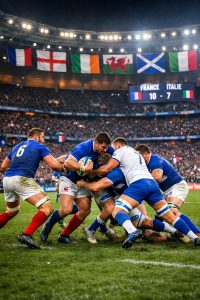In the aftermath of the Champions Cup final, where Union Bordeaux-Bègles (UBB) triumphed over Northampton Saints 28-20, the spotlight shifted from the pitch to a post-match altercation involving Saints’ 20-year-old flanker, Henry Pollock. The incident, which saw Pollock confronted by UBB players, has sparked discussions about sportsmanship, preparation tactics, and the psychological dynamics of high-stakes rugby.
As the final whistle blew at the Principality Stadium, tensions escalated when Pollock was reportedly grabbed around the neck by Bordeaux prop Jefferson Poirot. This confrontation followed an exchange between Pollock and UBB fly-half Matthieu Jalibert. Northampton’s director of rugby, Phil Dowson, described the incident as “uncalled for and out of order,” noting that officials assured him the matter would be addressed.
Jalibert shed light on the underlying cause of the fracas, stating that comments made by Saints players in the press prior to the match, labeling Bordeaux as a “club of mercenaries,” were not well-received. He emphasized the importance of respecting all clubs and their histories, suggesting that such remarks were used as a motivational tool by Northampton but crossed a line in terms of respect.
Known for his confrontational style and on-field exuberance, Pollock has been a rising star for Northampton this year. His approach, while effective, has occasionally ruffled feathers off the pitch. In a recent interview, Pollock acknowledged that not everyone appreciates his celebratory antics, stating, “If they want to hate me, they can hate me, if they want to like me, they can like me.” This candidness reflects a player unafraid to embrace his role as both a competitor and a provocateur.
The rugby community’s response has been mixed. Some fans criticized Pollock’s behavior as immature, while others defended his passion and commitment to the game. The incident has sparked broader conversations about the psychological strategies employed by teams and players, the fine line between motivation and disrespect, and the evolving nature of sportsmanship in modern rugby.
This episode serves as a reminder of the intense emotions and psychological tactics inherent in professional sports. While competitive fire is essential, maintaining respect for opponents remains paramount. As rugby continues to evolve, balancing passion with professionalism will be key to preserving the sport’s integrity and spirit.
Despite the noise, UBB’s achievement deserves full credit. Their Champions Cup victory is a testament to the skill, resilience and teamwork they’ve shown all season. From clinical finishing to sheer physicality in the moments that mattered, they earned every inch of that trophy.
And leading the charge was Damian Penaud, who deservedly walked away with the man of the match accolade having scored 2 tries. In doing so, he followed in the footsteps of fellow French rugby icons like Grégory Alldritt and Antoine Dupont, who have each claimed the same honour in recent years. It was a performance of flair, precision and that certain French je ne sais quoi that makes them so infuriatingly good when they get it right; and UBB certainly got it right on the night!
This win puts them in strong contention for the double, just as we did last year, and if they manage it, it will be an extraordinary statement from a team who, not so long ago, were thrashed 59-3 by us in last year’s Top14 final. Back then, UBB took the hit without lobbing insults at either our squad or president. They went home, got to work, and came back stronger. There’s a lesson in that.
Whether in rugby, business or the local PTA, professionalism means doing your job well and letting others do theirs. Chucking stones at your rivals might win you a few cheers from the pub crowd and trolls, but it mostly just shows you’ve run out of skill and started flinging gravel. Focus on your craft, keep your head, and leave the drama to the soaps !



